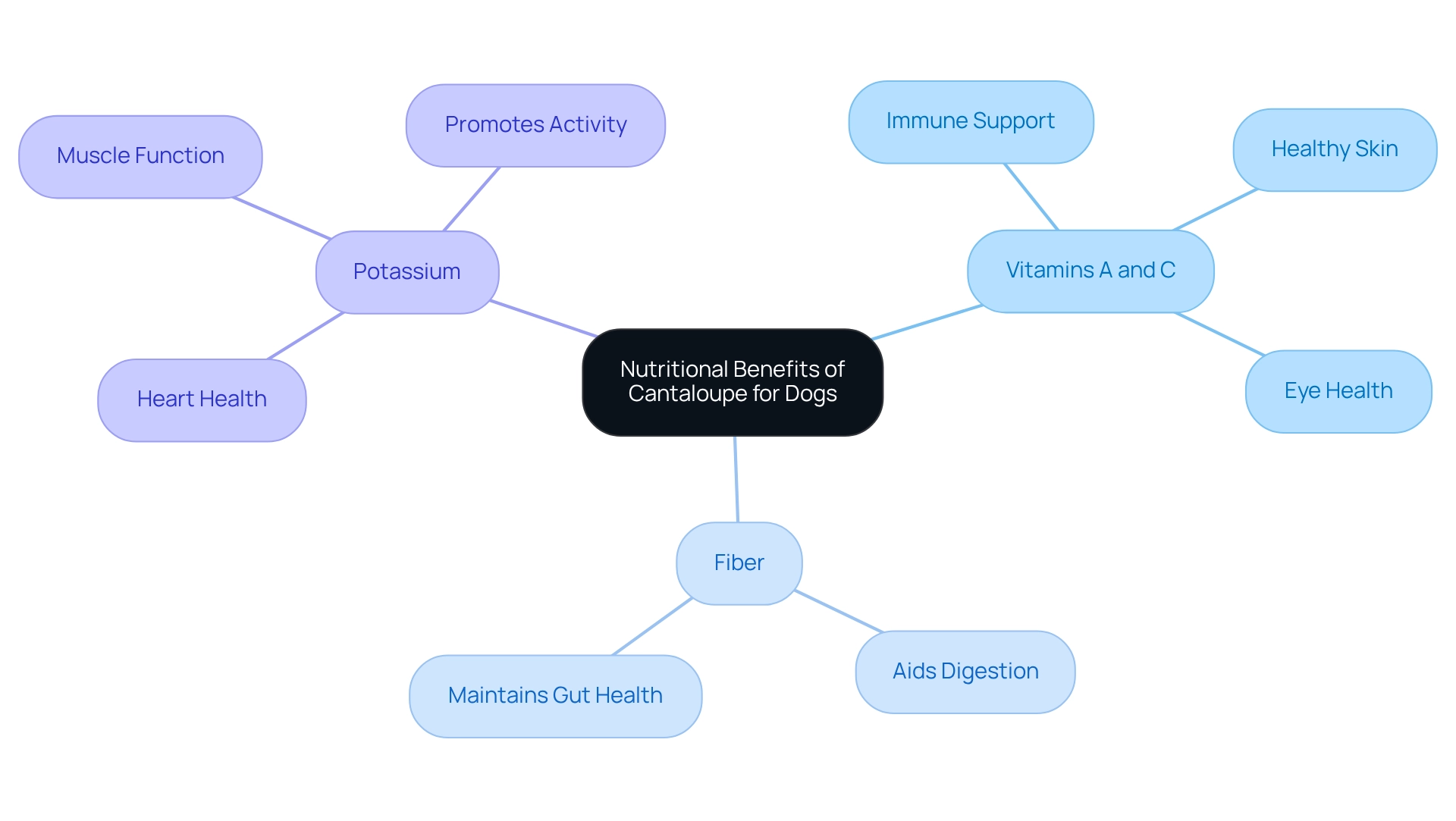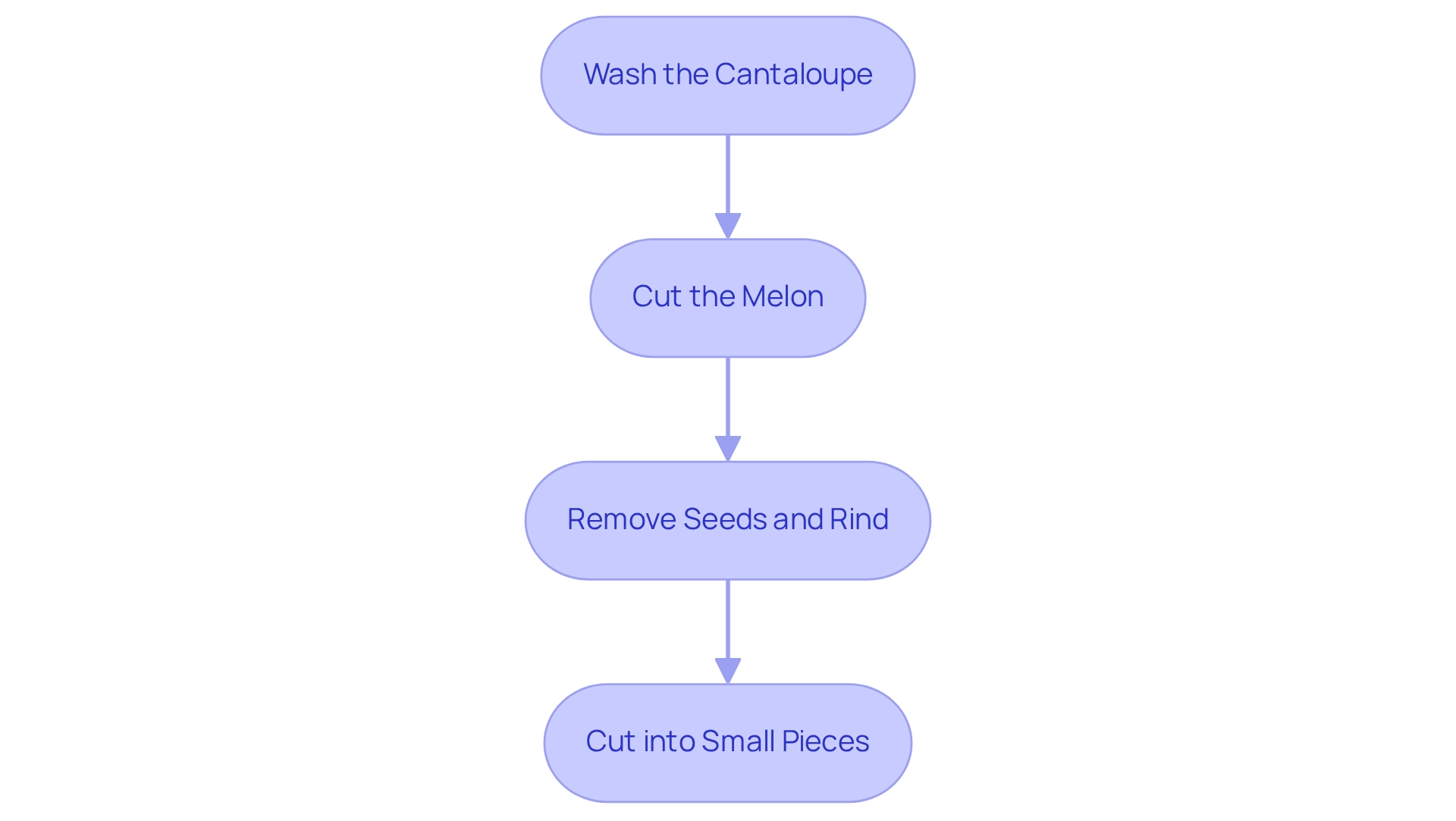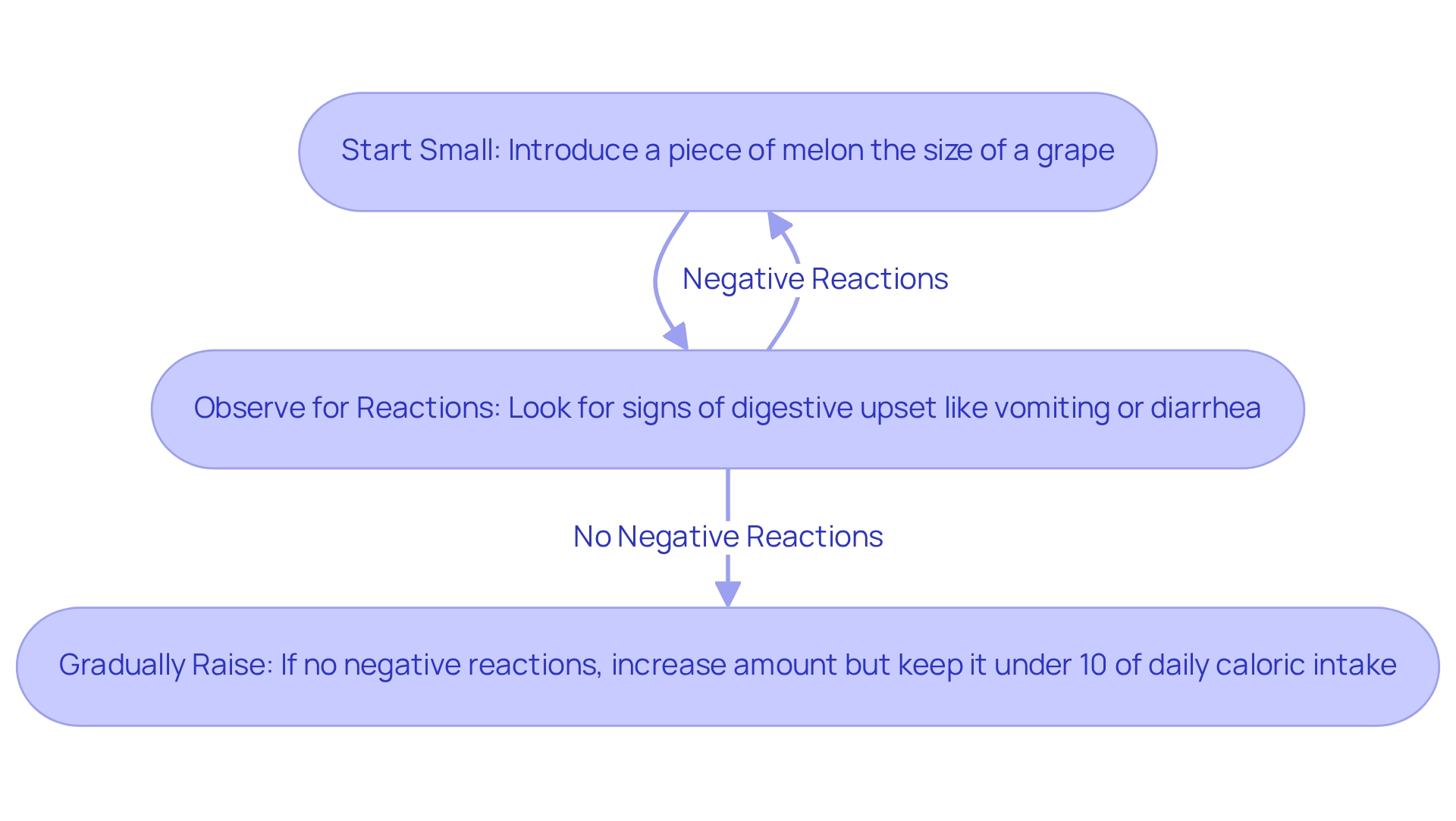Can Dogs Have Cantaloupe? Safe Preparation and Benefits
Overview
Caring for your furry family members means considering what treats are safe and healthy for them. Did you know that dogs can enjoy cantaloupe when it’s prepared correctly and given in moderation? This delightful fruit is packed with vitamins A and C, fiber, and potassium, making it a nutritious choice for your beloved pets.
To ensure a safe experience, it’s important to follow specific preparation steps:
- Always slice the cantaloupe into manageable pieces.
- Remove the seeds and rind to prevent any choking hazards.
- Moderation is key, as too much cantaloupe can lead to digestive issues.
- As you introduce this tasty treat, keep a close eye on your dog for any adverse reactions.
By taking these precautions, you can offer cantaloupe as a delightful treat that your dogs will love. It’s a wonderful way to show them you care, while also providing them with health benefits. Remember, your attention to their needs creates a nurturing environment where they can thrive.
Introduction
As pet owners increasingly seek nutritious and tasty treats for their furry family members, cantaloupe emerges as a delightful option that not only satisfies a dog’s palate but also provides numerous health benefits. This juicy fruit is low in calories and packed with essential vitamins and minerals, making it an ideal snack, especially during warmer months.
However, introducing cantaloupe into a dog’s diet requires careful preparation and moderation to ensure safety and enjoyment. From understanding its nutritional advantages to monitoring your dog’s reactions, this guide offers valuable insights into how to incorporate this refreshing fruit into your pet’s treat repertoire.
Understand the Nutritional Benefits of Cantaloupe for Dogs
Cantaloupe is a nutrient-rich fruit that offers a wealth of health benefits for your furry family members. With its low calorie count and high water content, it makes for an excellent hydrating snack, particularly during those hot summer days. Let’s explore the key nutrients found in this delightful fruit:
- Vitamins A and C: These essential vitamins are wonderful for supporting immune function and promoting healthy skin and eyesight.
- Fiber: This vital component aids in digestion, helping to maintain a happy and healthy gut.
- Potassium: An important nutrient for heart health and muscle function, ensuring your pet stays active and vibrant.
If you’re wondering, can dogs have cantaloupe, it can serve as a delightful and healthy alternative to traditional dog treats when given in moderation. This is especially beneficial for overweight dogs, as it provides a touch of sweetness without the burden of excessive calories. So, why not treat your beloved companion to this refreshing snack, and consider if can dogs have cantaloupe? Your pet will surely appreciate the love and care you show through thoughtful choices!

Prepare Cantaloupe Safely for Your Dog
Preparing cantaloupe for your furry family member can be a delightful experience, especially when you ask, can dogs have cantaloupe? To ensure your dog enjoys this tasty treat safely, follow these simple steps:
- Wash the Cantaloupe: Begin by rinsing the outer skin thoroughly under running water. This step helps remove any pesticides or dirt, ensuring a clean snack for your pet.
- Cut the Melon: With a sharp knife, slice the melon in half, revealing the juicy flesh inside.
- Remove Seeds and Rind: Carefully scoop out all the seeds and discard the rind. These parts can pose choking hazards and may cause digestive issues, so it’s essential to keep your dog safe.
- Cut into Small Pieces: Finally, slice the flesh into small, bite-sized pieces. This makes it easier for your dog to eat and digest, allowing them to enjoy the sweet taste of cantaloupe, leading to the question: can dogs have cantaloupe safely, creating joyful moments together.

Introduce Cantaloupe in Moderation
When incorporating melon into your furry family member’s diet, it’s important to ask, can dogs have cantaloupe, and to do so in moderation. Here’s a gentle guide to help you:
- Start Small: Begin with a small piece of melon, about the size of a grape, to see how your dog reacts. This initial step is essential in ensuring their comfort.
- Observe for Reactions: Keep a watchful eye for any signs of digestive upset, such as vomiting or diarrhea, after your dog enjoys the melon. Your attentiveness is key to their well-being.
- Gradually Raise: If your dog enjoys the melon and shows no negative reactions, you can gradually increase the amount. However, it should not exceed 10% of their daily caloric intake, ensuring a balanced diet. By introducing melon gradually, you can explore if can dogs have cantaloupe as a safe and enjoyable treat for your dog, fostering a nurturing environment where they feel loved and cared for.

Monitor Your Dog’s Reaction to Cantaloupe
After giving your dog melon, it’s essential to monitor their reaction closely. As a caring pet owner, you want to ensure your furry family members are safe and happy. Here are some signs to watch for:
- Positive Reactions: If your dog enjoys the cantaloupe and shows no signs of distress, you can conclude that can dogs have cantaloupe as a safe treat for them. This can be a delightful addition to their diet!
- Negative Responses: However, if you notice symptoms such as vomiting, diarrhea, or signs of discomfort, it’s important to take action. Stop providing melon and consult your veterinarian for guidance.
- Allergic Reactions: Although rare, some dogs may have allergies to melon. Symptoms can include itching, swelling, or difficulty breathing. If you notice any concerning signs, seek veterinary assistance immediately, and by keeping a close eye on your dog after introducing cantaloupe, you can find out if can dogs have cantaloupe safely. Remember, your vigilance is key to providing a nurturing environment for your beloved pet.

Conclusion
Incorporating cantaloupe into your furry family member’s diet can be a truly rewarding experience for both you and your beloved pet. This nutrient-rich fruit offers a wealth of health benefits, including:
- Essential vitamins A and C
- Fiber for healthy digestion
- Potassium for a strong heart
With its low-calorie and high-water content, cantaloupe serves as a fantastic hydrating treat, especially during those warm summer months.
However, ensuring the safety and enjoyment of this delightful fruit requires careful preparation and moderation. Properly washing, cutting, and removing seeds and rind are essential steps to prevent choking hazards and digestive issues. Introducing cantaloupe gradually allows you to monitor your dog’s reactions, ensuring this tasty treat becomes a positive addition to their diet.
Ultimately, by being attentive to your dog’s health and preferences, you can confidently include cantaloupe as a delicious and nutritious snack. With the right approach, this refreshing fruit not only enhances your dog’s diet but also provides a delightful taste experience. Embracing cantaloupe as a treat supports your dog’s well-being and strengthens the bond between you and your pet through shared moments of joy.
Frequently Asked Questions
What are the health benefits of cantaloupe for pets?
Cantaloupe is a nutrient-rich fruit that offers several health benefits for pets, including supporting immune function, promoting healthy skin and eyesight, aiding digestion, and contributing to heart health and muscle function.
What key nutrients are found in cantaloupe?
Cantaloupe contains essential vitamins A and C, fiber, and potassium, which are beneficial for immune health, digestion, and overall vitality.
Can dogs eat cantaloupe?
Yes, dogs can have cantaloupe as a healthy alternative to traditional dog treats when given in moderation. It can be especially beneficial for overweight dogs due to its low calorie count.
Why is cantaloupe a good snack for dogs during summer?
Cantaloupe has a high water content, making it an excellent hydrating snack for dogs, particularly during hot summer days.







